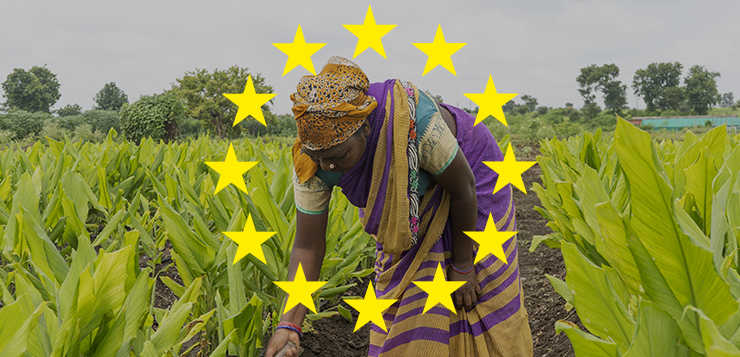
Global trade is entering a new phase, one driven by sustainability, climate action and stricter food standards, and at the forefront of this movement is the European Green Deal. As one of the world’s major importers of agriculture products, the EU’s policies are set to ripple across global markets, including India’s agriculture sector. Indian farmers now face the pressing challenge of meeting these standards while continuing to compete on the international stage. But what does this transformation mean for our farmers, and how can they navigate these new expectations without losing ground in global markets?
At the heart of the European Green Deal is the Farm to Fork (F2F) Strategy, a comprehensive approach to making food systems fair, healthy and environmentally friendly. This strategy goes beyond traditional food production. It requires a complete transformation of agricultural practices to ensure a sustainable future. For Indian farmers, the impact of the F2F Strategy will be significant. One of the key elements is the reduction of chemical pesticide usage by 50% by 2030. This is an important target, as many Indian farmers rely heavily on pesticides. According to the Union Ministry of Agriculture and Farmers Welfare, 60,00 tonnes of chemical pesticides were used annually between 2017-18 and 2021-22. Meeting the EU’s requirements will necessitate a shift towards integrated pest management (IPM) and organic farming methods, both of which are resource-intensive and require technological support and training. Additionally, the reduction of fertiliser use by 20% will further challenge traditional farming methods, but it will also create opportunities for adopting sustainable, eco-friendly alternatives.
Another critical component of the Green Deal affecting Indian farmers is the Sustainable Use of Pesticides Directive (SUD) and the Regulation on Plant Production Products (PPP). These policies established strict rules for pesticide residue levels in food imports, and non-compliance can result in restricted or banned exports to the EU. For India, this means that crops such as tea, rice, tobacco, and spices, which are often scrutinised for pesticide residues, will face even tougher testing protocols. Farmers will need access to better testing, monitoring, and alternative pest control methods to meet these higher standards.
Further, the Biodiversity Strategy for 2030 and EU Climate Lawintroduce stringent regulations to ensure that imports, including those from countries like India, do not contribute to biodiversity loss or climate degradation. With the EU committed to climate neutrality by 2050, trade partners will increasingly be required to demonstrate that their agricultural practices align with environmental protection goals.
This is where carbon footprints and sustainable land use come into play. Indian farmers, especially those growing export-driven crops, will need to show that their products are produced sustainably without contributing to deforestation, biodiversity loss, or excess greenhouse gas emissions. For this, traceability and transparency in supply chains will be critical. The EU’s proposed Deforestation Regulation mandates that companies importing commodities like soy, palm oil, and coffee must ensure that these products are not linked to deforestation. This regulation alone could dramatically reshape the way Indian exporters engage with the European market.
What do Indian Farmers need?
The new standards under the European Green Deal may seem daunting, but they also present an opportunity for transformation. The EU’s focus on sustainability, transparency, and ethical trade means that Indian farmers must adopt better technologies, modernise their farming practices and invest in sustainable alternatives to remain competitive.
First, the government and private sector must offer more support to farmers through training, subsidies for sustainable inputs and infrastructure for testing and certification. Financial and technological investments will be key in helping farmers transition to organic and sustainable farming methods.
Second, collaborative efforts between the government, agricultural institutions and trade bodies are necessary to ensure that Indian farmers are well-equipped to meet the EU’s evolving standards. This includes initiatives to educate farmers on sustainable practices, certification like organic farming and advanced pest control methods.
Lastly, the transition must be inclusive. While large agriculture players may have the resources to adopt, smallholder farmers will need extra support to ensure they aren’t left behind. This is not just about meeting European standards. It’s about securing the future of Indian agriculture in a global market that is increasingly prioritising sustainability.
Adapting to these new sustainability standards is not optional. It is essential for maintaining access to one of the world’s most important markets. However, with the right support and investments, Indian agriculture can not only meet these standards but also thrive in the new, green economy. The path forward may be difficult, but with strategic planning, Indian farmers can ensure their place in the future of global agriculture.
